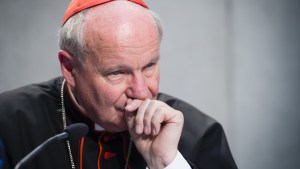On January 22, 2025, Pope Francis accepted the resignation of Cardinal Christoph Schönborn. The Austrian prelate is retiring on his 80th birthday after 30 years as head of the Archdiocese of Vienna. Pending the appointment of his replacement, the archdiocese is entrusted to an apostolic administrator, Fr. Josef Grünwidl, 62, one of the current episcopal vicars.
In accordance with canon law, Cardinal Schönborn loses his status as elector at the end of the day of his 80th birthday. The College of Cardinals now has 138 electors and 114 non-electors.
The Pope’s decision to wait until Cardinal Schönborn’s 80th birthday, despite health problems, before accepting his resignation is a sign of the Austrian Primate’s important place in the College of Cardinals. The cardinal tendered his resignation five years ago, in line with the canonical retirement age for bishops, which is set at 75.
Pope John Paul II created Christoph Schönborn cardinal in 1998, three years before Cardinal Jorge Mario Bergoglio. He was considered by some to be a papabile at the 2013 conclave. The Austrian cardinal was the longest-serving member of the electoral college after Cardinal Vinko Puljić, archbishop emeritus of Sarajevo (created cardinal in 1995). He was also one of the oldest active cardinals, just behind Cardinal Oswald Gracias, who at 80 is still Archbishop of Bombay.
A close friend of Benedict XVI
A pupil of Joseph Ratzinger (the future Benedict XVI) in his youth, this member of the Order of Preachers (Dominicans) is from one of Austria’s most aristocratic families. He taught dogmatic theology for many years in Fribourg, Switzerland. In 1980, Pope John Paul II made him a member of the prestigious International Theological Commission, where he joined Cardinal Ratzinger, appointed prefect of the Congregation for the Doctrine of the Faith the following year.
Involved in dialogue with the Orthodox world, he collaborated with Cardinal Ratzinger, who entrusted him with editing the new Catechism of the Catholic Church, published in 1992, as well as Youcat, a catechism for young people. In 1991, Pope John Paul II appointed him Auxiliary Bishop of the Archdiocese of Vienna.
In 1995, aged just 50, he became archbishop of the Austrian capital. The previous archbishop had been forced to resign following serious accusations of sexual abuse of minors. Taking charge of a diocese severely tested by the scandal, he proved steadfast in the face of resistance from some of the local clergy.
In 1998, Pope John Paul II created him a cardinal. That same year, he became President of the Austrian Bishops’ Conference, a position he held for 22 years.
A bridge between Benedict XVI and Francis
A loyal supporter of Pope Benedict XVI after his election to the Throne of Peter in 2005, Cardinal Schönborn was also one of the most important cardinals at the start of Pope Francis’ pontificate in 2013.
In particular, he played a decisive role in the two assemblies of the Synod on the Family in 2014 and 2015. Schönborn supported the Pope’s desire to take a more pastoral approach to the highly controversial issue of the treatment of divorced-remarried people.
Also involved in the discussions of the Synod on Amazonia, he didn’t close the door on the presence of married priests in the Latin Church, although he doesn’t fight in favor of this measure. His pastoral stance towards the homosexual community (he is in favor of homosexual civil unions and supports Fiducia supplicans) does not, however, make him a member of the most progressive fringe of the College of Cardinals. The cardinal defends the Church’s teaching on homosexuality and firmly opposes the reformist initiatives of the German Synodal Way.
Although weakened by illness — he suffered a pulmonary embolism in 2019 — Cardinal Schönborn remains a leading figure in the College of Cardinals, as demonstrated by his presence at the last Synod on Synodality. Although he will not be able to take part in the next conclave, his stature means that his voice will certainly be heard at the general congregations preceding the election.
A pending succession
On the subject of his succession, the cardinal recently declared that he was serene despite a delay in the choice of the next archbishop of Vienna. “There may be a situation in which candidates are considered but rejected, or new questions arise during the decision-making process,” he recently told the Viennese Catholic newspaper Der Sonntag.
Until a new archbishop is found, one of the three vicars of the Archdiocese of Vienna, Father Grünwidl, has been appointed to take over from the cardinal. “We expect a decision within the next few weeks,” said a spokesman for the archdiocese, adding that the process seems to be “already well advanced.”



